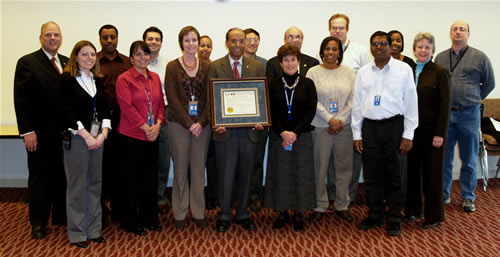Home.Scientific Services Division.ISO 17025 Accreditation of TTB Laboratories Galvanizes

ISO 17025 Accreditation of TTB Laboratories Galvanizes World-Class Reputation
For two years, the Scientific Services Division (SSD) has actively sought accreditation by the International Organization for Standardization (ISO) in order to seal its already stellar reputation for performing world-class science in the fields of alcohol and tobacco.
In the fall of 2007, two SSD laboratories—the Beverage Alcohol Laboratory (BAL) and the Compliance Laboratory (CL)—achieved this goal by receiving ISO 17025 accreditation from the American Association for Laboratory Accreditation (A2LA), an accreditation body in the United States.
ISO is a non-governmental organization that promotes the development of standardized methods to facilitate the international exchange of goods and services. ISO accreditation reduces inefficiencies and puts mechanisms in place for continuous improvement of laboratory processes and procedures. Through accreditation, SSD achieves third-party recognition of its quality results, which promotes acknowledgement and respect for our laboratories' technical competence by industry and other agencies, both nationally and internationally.
 |
To achieve ISO accreditation, SSD had to document every laboratory method, protocol, and process. Several documents and processes needed updating to meet these requirements. Our chemists also had to demonstrate proficiency in each of the methods used for analysis that fall within the scope of our accreditation. Though TTB has always used validated methods for its routine laboratory analysis, such as alcohol proof and heavy metals testing, with ISO accreditation our labs must maintain extensive records that show they adhere to the proper process in performing mission-critical lab work on a day to day basis.
Though the administrative paperwork required to track the quality control program, like the Quality Procedure Documents and Corrective Action Requests, can be daunting, SSD Director Dr. Abdul Mabud still refers to the ISO system as "the best friend" of his laboratory supervisors. The inherent advantage of the ISO system, according to Dr. Mabud, is that the laboratory can self-assess and correct the root cause of any laboratory inefficiency or error. For example, by evaluating the root cause of a sample processing mistake, SSD can take steps to prevent the mistake from reoccurring in the future.
SSD Quality Manager Cathy Halverson describes the journey to receive accreditation of its laboratories as a series of fits and starts. Back in 1999, when TTB was still part of the Bureau of Alcohol, Tobacco and Firearms (ATF), laboratory personnel initiated an investigation into the various accreditation programs. At that time, we determined that the ISO 17025 standard was the best fit for the work performed by what was then the Alcohol and Tobacco Laboratory.
However, ATF considered the analytical work performed in the areas of alcohol and tobacco as secondary to its firearms and explosives testing. It was not until 2001 that the ATF Executive Committee committed to support the laboratory's accreditation efforts. Even then, the lab was unable to achieve significant progress over the next four years due to a lack of resources, staffing turnover, and a major reorganization within the Federal Government, which included the creation of the Alcohol and Tobacco Tax and Trade Bureau in 2003.
However, with the reorganization came a reinvention of the laboratory system into the TTB Scientific Services Division. Under new management and armed with a firm commitment from the TTB executive staff, the accreditation efforts began in earnest in fiscal year (FY) 2006.
TTB decided to focus its initial accreditation efforts on the BAL and the CL because the bulk of their work suited the ISO 17025 standard requirements. During FY 2006, SSD concentrated on completing and implementing the many policy and procedure documents required by the standard, validating the test methods under the scope of accreditation, and training the staff.
The culmination of these efforts was an application to A2LA for a pre-assessment of the laboratory in December 2006. With much diligence and perseverance, the BAL and CL employees managed to address and fix all of the identified requirements from the pre-assessment and the final assessment, gaining accreditation in October 2007.
"ISO accreditation by A2LA is recognition that the work of TTB's laboratories meets the highest standards of excellence," Bill Foster, Assistant Administrator, Headquarters Operations said. "The work our lab does to support TTB's regulatory and enforcement missions is authoritative and demonstrates our commitment to accuracy and precision as we fairly and impartially measure compliance by the regulated industries."
Now that accreditation has been attained, the lab's next challenge is to maintain its accreditation through vigilance and training. In the next year, SSD's Quality Manager will hold ongoing training for chemists and conduct semi-annual internal audits. SSD plans to seek accreditation of its tobacco program in FY 2008. The BAL and CL also will expand the scope of their accreditation beyond the routine regulatory methods to include methods still in development, including allergen testing.
To view the certificate and scope of accreditation for each laboratory, click the appropriate link below.
BAL Scope and Certificate
CL Scope and Certificate
TTB Disclaimer of Endorsement: Any reference made to ISO 17025 Standard or ISO does not constitute or imply an endorsement by TTB or the United States Government of the product, process, or service, or its producer or provider. The views and opinions expressed in this article do not necessarily state or reflect those of the TTB or the United States Government.
